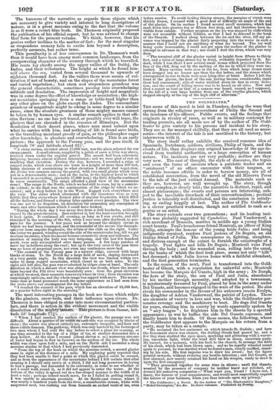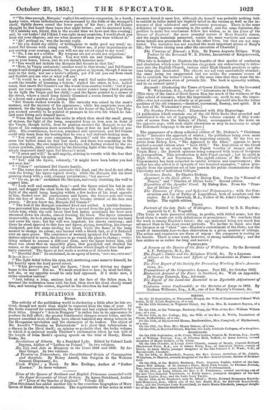THE GOLDBEATER. * THE scene of this novel is laid in
Flanders, during the wars that sprung from the religious persecutions of Philip the Second and the insolence of his officers. Public events, and the feelings that originate in rivalry of races, as well as in military contempt for trading pursuits, are all made use of by the author of The Gold- beater to give variety to his persons and incident to his story. They are so far managed skilfully, that they are all used as acces- sories—the interest of the tale is not sacrificed to the history, bat interwoven with it.
The story itself rather exhibits the received romance idea of Spaniards, Dutchmen, soldiers, civilians, Philip of Spain, and the events of life, than displays any original knowledge of the age de- rived from truthful authorities, or a large conception of human nature. The incidents are not very probable ; neither are they very new. The cast of thought, the style of discourse, the topics and even the turns of sarcasm when a patriotio trader and an " aristocrat " of an officer encounter with their tongues, or the noble becomes affable in order to borrow money, are all of established convention, from the novel of the old Minerva Press to the tale of the just extinct Annual. The materials such as they are, however, are well wrought up. The story, though rather complex, is clearly told ; the narrative is distinct, rapid, and almost picturesque; the events and persons are interesting, sub- ject to the inevitable drawback of their conventionalism ; poetical justice is tolerably well distributed, and the conclusion is satisfy- ing, as ending happily at last. The author of The Goldbeater is a clever practised workman, though not entitled to rank as a genius or an artist.
The story extends over two generations ; and its leading inci- dent was probably suggested by Cymbeline. Paul Vanderwerf, a rich merchant of Brussels, marries in middle age a young Italian court beauty. Paul's treacherous friend Montonli, an officer of King Philip, attempts the honour of the young bride Julia; and being indignantly repulsed, renders Paul jealous of De Begnis, an old. Italian friend of Julia. The consequence is, fighting, slaughter, and distress enough at the outset to furnish the catastrophe of a tragedy. Paul fights and kills De Begnis ; Montculi runs Paul through the body ; and the wounded man, rolling into the canal, on the banks of which the duel took place, seems not only " kilt" but drowned ; while Julia leaves home with a faithful attendant, and the first generation terminates. In the course of the next, Paul is transformed into the Gold- beater of Ghent, with a reputation for unlawful arts ; Montculi has become the Marquis del Guasto, high in the army ; De Burgh, the hero of the story, the son of Paul and Julia, abandoned by his mother through necessity, and adopted by a townsman, is mysteriously favoured by Paul, placed by him in the army under Del Guasto, and becomes engaged in the wars of the period. He also rivals his commander in the favour of his unknown cousin Evelyn, the daughter of Adrian Vanderwerf, the patriot of Leyden. These are elements of variety in love and war, while the Goldbeater per- sonates revenge and the machinery to boot. He dogs Del Guasto for years, startling him in society by words apparently spoken by an " airy tongue " ; he frightens him in the streets by a spectral appearance ; in war he baffles the side Del Guasto espouses, and finally hunts him to death. Of these scenes, the following, where the Goldbeater first appears to the Marquis on his return from a party, may be taken as a sample. "He mounted the low eminence on which (stands St. Gudule ; and here the firmament above was clearer, the drifting clouds had passed by, and a few tiny stars studded the open space, sparkling and glittering with a waver- ing, uncertain light, while the wind still blew in sharp, uncertain gusts. He turned, for a moment, with his back to the church, to arrange the folds of his cloak, which had been blown open ; and as he rapidly wheeled round again to proceed, he was startled when he found a man, closely muffled, stand- ing by his side. His first impulse was to draw his sword ; but the figure pointed onwards, without evincing any hostile intention ; and Del Guasto, at first alarmed, now merely retained his hand on his weapon, ready to draw it upon the first emergency. " They proceeded together for some time in silence ; until Del Guasto, wearied by the presence of company he neither knew nor relished, ad- dressed his unknown companion—' What want you, friend ? I have not, I fancy, the honour of your acquaintance, and would most respectfully request the nature of your business, when you thus intrude upon my privacy.'
• The Goldbeater ; a Novel. By the Author of "The Blacksmith's Daughter," "Mabel Carrington," &c. Sic. In three volumes. Published by Newby.
" "Tis time enough, Marquis,' replied his unknown companion, in a harsh, husky voice, whose indistinctness was increased by the folds of the stranger's cloak, tightly drawn round the lower parts of his face ; yet Del Guasto thought he had heard those tones that night before ; and he answered hotly, " If I mistake not, friend, this is the second time we have met this evening; and, by our Lade ! did I think I was right in my suspicion, I would pluck you from out your disguise, and Bee what manner of man you were without it.' '" Ah ! perhaps so,' was the laconic reply. " Do you doubt' my ability or avillinvess to make good my word,' re- torted Del Guasto with rising wrath. 'Follow me, if your impertinence do not overtop your courage and you will see my sword equal to my word.' " 'No, I am not a soldier. My weapons are not sword nor arquebuse.' " ' Some canting priest, then. You war with sin and temptation. Get you to your home, knave, and do not disturb honester men.' "'You would not include the Marquis Del Guasto in that list.'
'Now, by Virgin and saints! another word in that strain,' and Del Guasto stopped and stamped passionately, 'be you priest or layman, though I stab no man in the dark, nor use a bravo's stiletto, yet I'll cut you out from cloak and-doublet and see who or what yet are.'
"'It would be a needless task for all you'd find under them ; scarcely worth the trouble of loosening a button,' replied the other, in low, hollow tones, that smote Del Guasto's ear like words from another world : but if you mast see your companion, you can do so under yonder lamp which protects by its light the Virgin and her child,'—and the figure pointed to a corner of the street, where a small lamp faintly illumined a recess formed by the side of a house and a portion of a jutting wall. "Del Guasto walked towards it. His curiosity was raised by the man's manner, and the mystery of his appearance ; while his suspicions were also alarmed, for the language he had heard in the house of the ladies Van Hop- pen seemed covertly to be pointed at passages in his own life which he fan- cied none living save himself knew. " When they had reached the niche in which then stood the small group of statues, the light of the lamp, suspended from an iron arm in front of the Virgin, though feeble, from its position enabled the Marquis to see the figure of his companion more accurately than at first he had believed pos- sible. His countenance, however, remained still uncovered, and Del Guasto could only learn from his bearing that he was a tall stalwart-looking man.
" You would see your companion, Marquis ?' said the stranger in the same low hollow tones he had last used ; and there was something in the scene, the place, the awe inspired by the hour, the feeling evoked by the re- ligious symbols;dimly exhibited by the flickering light of the tiny lump, that deeply impressed itself upon Del Guasto's mind.
I must and will!' he said angrily, striving to wrestle with the fear that was fast paralyzing his spirit. " Yet,' said the figure, solemnly, it might have been better you had not seen me.'
" Pshaw !' exclaimed Del Guasto hastily. " The water does not often surrender the dead, and the dead do not often visit the living,' the figure replied slowly, while the Marquis felt his brow growing damp with a cold, clammy perspiration ; but see—' " Go on, go on!' exclaimed the Marquis, nervously clutching the wall to support him. "' Look well and earnestly, then,'—and the figure raised his hat in one hand, and dropped the cloak from his shoulders with the other, while the light of the small lamp, hanging within a few inches of his head opposite to him, flashed over his countenance and figure, the former pale and worn like the hue of death. Del Guasto's eyes became riveted on the face and person. ' Do you know me, Marquis Del Guest° ? ' " The look of the Marquis remained fixed and settled. A terrible fascina- tion prevented him removing his eyes for a second from the pale countenance before him, while the cold sweat that had before moistened his brow now streamed down his cheeks, almost freezing his blood. The figure remained immoveable, its look piercing and firm. Del Guasto strove to raise his hand and cover his eyes; but his will was impotent, his sinews unstrung; and there he stood opposed to this face and figure, gazing, trembling, his courage dissipated, and fear alone circling his heart, while the flame of the lamp seemed to change its colour, and burned with a bluish tint, as if it flickered over an open grave. The conscience of memory agonized Del Guasto. The statues appeared to move, the houses to go round, the place to change - every- thing seemed to assume a different form, save the figure before him, and there was about that an unearthly glare, that paralyzed and shocked his senses, as its appearance called up reflections which length of time had par- tially removed. The figure at last made a motion as if towards him. " Merciful God I' he exclaimed, in an agony of terror, save me, save me ! It is—it is— " The light faded before his eyes, and, muttering some name to himself, he fell heavily upon the hard paved street. " What prevents me,' said the figure, from now 'hiving my dagger home to his heart ? But no. We must meet face to face ; he must feel him- self die, or my appetite would be only half appeased. If I strike now, I strike senseless carrion.'
"And, taking a long, anxious look at the face of the fallen man, he spurned the motionless mass with his foot, then drew his cloak closely round him, and turning the corner, departed in the direction he had come."



























 Previous page
Previous page